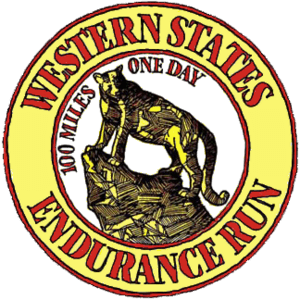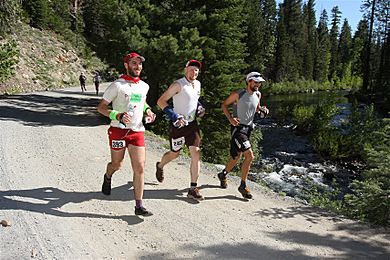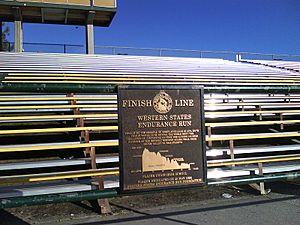Western States Endurance Run facts for kids
Quick facts for kids Western States Endurance Run |
|
|---|---|

Western States Endurance Run logo patch
|
|
| Date | Last weekend of June |
| Location | Olympic Valley, California Auburn, California |
| Event type | Ultramarathon trail run |
| Distance | 100.2 miles (161 km) |
| Established | 1977 |
| Course records | Men: 14:09:28 (2019) Jim Walmsley Women: 15:29:34 (2023) Courtney Dauwalter |
| Official site | www.wser.org |
The Western States Endurance Run, often called the Western States 100, is a super long running race. It's an ultramarathon, which means it's much longer than a regular marathon. This race covers 100.2 miles (about 161 kilometers) through the tough Sierra Nevada Mountains in California.
Runners tackle this challenge every year on the last full weekend of June. It's known as one of the hardest and most exciting ultramarathons in the United States. The race is managed by a group called the Western States Endurance Run Foundation.
The Western States 100 is also part of something called the Grand Slam of Ultrarunning. This "Grand Slam" includes five different 100-mile races. Finishing all of them is a huge achievement for runners!
History of the Race
How it Started
The idea for the race began in 1972. Twenty soldiers from Fort Riley, Kansas, tried to run the same path as the Tevis Cup horse ride. The horse race had a 24-hour time limit. So, the soldiers started a day early. Seven of them finished the 100.2 miles. This was later called the "Auburn Endurance March."
In 1974, a runner named Gordy Ainsleigh became the first person to run the course in under 24 hours. He finished in 23 hours and 42 minutes!
The First Official Race
The first official Western States Endurance Run happened in 1977. Sixteen runners signed up. They had to bring most of their own supplies. Only three runners made it to the end. Andy Gonzales was the only one to finish within the 24-hour limit. The other two finished a bit later. Because of them, the race added awards for finishing in under 30 hours.
In 1978, the Western States Endurance Run became its own event, separate from the horse race. It moved to June. That year, 63 runners competed, and 30 finished. Pat Smythe became the first woman to complete the race.
Growing Popularity
By 1980, the race had grown a lot, with 250 runners from many places. Because so many people wanted to join, a lottery system was started in 1981. This means runners had to be chosen randomly to get a spot.
In 1984, a special wilderness area was created. Part of the race trail was inside this new area. This meant organized events usually couldn't happen there. But in 1988, the United States Congress gave special permission for the race to continue. However, the number of runners was limited to 369.
The course was officially measured in 1985 and found to be 100.2 miles. Because of this, records from before 1985 are kept separate. The race even appeared on TV shows like ABC's Wide World of Sports!
Race Cancellations
The race has been canceled a few times.
- In 2008, it was canceled because of bad air quality. There were many wildfires in California, and the smoke made it unsafe.
- In 2020, the race was canceled due to the COVID-19 pandemic.
The Race Course
The Western States Endurance Run has used the same path since 1986. It follows a part of the Western States Trail. This trail is so wild that much of it can only be reached by walking, riding a horse, or by helicopter!
Starting Point and Journey
The race begins at the Palisades Tahoe ski resort in Olympic Valley. Runners then travel through places like Foresthill and Cool. The course crosses the American River Canyon. The finish line is at the Placer High School track in Auburn, California.
The trail is very rugged. Runners might face snow on high mountain passes. Temperatures can change a lot during the race, from very cold (around 20 degrees Fahrenheit) to extremely hot (over 110 degrees Fahrenheit).
Hills and Valleys
Runners climb a total of 18,090 feet (about 5,500 meters) and go down 22,970 feet (about 7,000 meters). That's a lot of up and down!
The race starts at 6,200 feet high. Right away, runners climb to Emigrant Pass, which is 8,750 feet high. That's a climb of 2,550 feet in just the first 4.5 miles! The trail then drops and climbs through many canyons and hills. One tough spot is "Devil's Thumb," where runners drop 2,000 feet and then climb 1,500 feet.
River Crossing
Around mile 78, runners must cross the American River at a place called Rucky Chucky. Usually, they wade across using a guide rope. But if the water is too high, they get to cross in river rafts!
How Long it Takes
Because the race is so long, it starts very early, at 5 a.m. Runners continue through the day and into the night to finish.
Help Along the Way
There are 20 aid stations along the course. These stations provide food, water, and medical help. Ten of them are major medical checkpoints.
Awards and Milestones
Finishing the Race
All runners who finish the race in less than 30 hours get a special finisher's medallion.
Top Finishers
The fastest male and female runners each win the Western States Cougar Trophy. If they finish in under 24 hours, they also win the Wendell Robie Cup. This is a special trophy with the names of all past winners engraved on it.
Belt Buckles
Runners who finish the race in less than 24 hours earn a handmade silver belt buckle. This is a very special award! If they finish between 24 and 30 hours, they get a handmade bronze belt buckle.
There are also special belt buckles for runners who finish the race many times. For example, there are buckles for 10, 20, and 25 finishes under 24 hours. There are also buckles for running a total of 1000 miles or 2500 miles in the race!
Age Group Awards
Awards are given to the top three men and women in different age groups. These groups include 39 and under, 40-49, 50-59, 60-69, and 70 and over. The oldest male and female finishers also receive awards.
Famous Runners
- Jim King was the first runner to win the race on his first try in 1982. He won three times in total.
- Tim Twietmeyer holds the record for finishing the race the most times. He has completed it 25 times, and all of his finishes were under 24 hours! He also won the race five times.
- Scott Jurek holds the record for winning the men's race the most times in a row. He won seven times in a row!
- Ann Trason holds the record for the most wins by a woman. She won the race an amazing fourteen times!
- Courtney Dauwalter holds the current record for the fastest woman's time, set in 2023.
- Jim Walmsley holds the current record for the fastest man's time, set in 2019.
- In 2009, Amy Palmiero-Winters, who has a prosthetic leg, became the first amputee to finish the race.
- In 2016, Andrew Miller became the youngest winner ever at 20 years old.
Men's winners
| Year | Winner | Time | Age | Country |
|---|---|---|---|---|
| 2025 | Caleb Olson | 14:11:25 | 29 | |
| 2024 | Jim Walmsley | 14:13:45 | 34 | |
| 2023 | Tom Evans | 14:40:22 | 31 | |
| 2022 | Adam Peterman | 15:13:48 | 26 | |
| 2021 | Jim Walmsley | 14:46:01 | 31 | |
| 2020 | Cancelled due to the COVID-19 pandemic | |||
| 2019 | Jim Walmsley | 14:09:28 | 29 | |
| 2018 | Jim Walmsley | 14:30:04 | 28 | |
| 2017 | Ryan Sandes | 16:19:38 | 35 | |
| 2016 | Andrew Miller | 15:39:36 | 20 | |
| 2015 | Rob Krar | 14:48:59 | 38 | |
| 2014 | Rob Krar | 14:53:22 | 37 | |
| 2013 | Timothy Olson | 15:17:27 | 29 | |
| 2012 | Timothy Olson | 14:46:44 | 28 | |
| 2011 | Kilian Jornet | 15:34:24 | 23 | |
| 2010 | Geoff Roes | 15:07:04 | 34 | |
| 2009 | Hal Koerner | 16:24:55 | 33 | |
| 2008 | Cancelled due to poor air quality caused by 2008 California wildfires | |||
| 2007 | Hal Koerner | 16:12:16 | 31 | |
| 2006 | Graham Cooper | 18:17:28 | 36 | |
| 2005 | Scott Jurek | 16:40:45 | 31 | |
| 2004 | Scott Jurek | 15:36:27 | 30 | |
| 2003 | Scott Jurek | 16:01:18 | 29 | |
| 2002 | Scott Jurek | 16:19:10 | 28 | |
| 2001 | Scott Jurek | 16:38:30 | 27 | |
| 2000 | Scott Jurek | 17:17:24 | 26 | |
| 1999 | Scott Jurek | 17:34:22 | 25 | |
| 1998 | Tim Twietmeyer | 17:51:20 | 39 | |
| 1997 | Mike Morton | 15:40:41 | 25 | |
| 1996 | Tim Twietmeyer | 17:42:06 | 37 | |
| 1995 | Tim Twietmeyer | 18:34:58 | 36 | |
| 1994 | Tim Twietmeyer | 16:51:01 | 35 | |
| 1993 | Tom Johnson | 17:08:34 | 34 | |
| 1992 | Tim Twietmeyer | 16:54:16 | 33 | |
| 1991 | Tom Johnson | 15:54:05 | 32 | |
| 1990 | Tom Johnson | 16:38:52 | 31 | |
| 1989 | Mark Brotherton | 16:53:39 | 32 | |
| 1988 | Brian Purcell | 16:24:00 | 32 | |
| 1987 | Herb Tanzer | 17:41:06 | 35 | |
| 1986 | Chuck Jones | 16:37:47 | 27 | |
| 1985 | Jim King | 16:02:44 | 28 | |
| 1984 | Jim King | 14:54:00 | 27 | |
| 1983 | Jim Howard | 16:07:00 | 29 | |
| 1982 | Jim King | 16:17:00 | 25 | |
| 1981 | Jim Howard | 16:02:37 | 27 | |
| 1980 | Mike Catlin | 18:35:42 | 28 | |
| 1979 | Mike Catlin | 16:11:56 | 27 | |
| 1978 | Andy Gonzalez | 18:50:00 | 23 | |
| 1977 | Andy Gonzalez | 22:57:00 | 22 | |
| 1976 | Ken Shirk | 24:30:00 | 23 | |
| 1974 | Gordy Ainsleigh | 23:42:20 | 26 | |
Women's winners
| Year | Winner | Time | Age | Country |
|---|---|---|---|---|
| 2025 | Abby Hall | 16:37:16 | 34 | |
| 2024 | Katie Schide | 15:46:57 | 32 | |
| 2023 | Courtney Dauwalter | 15:29:34 | 38 | |
| 2022 | Ruth Croft | 17:21:30 | 33 | |
| 2021 | Beth Pascall | 17:10:42 | 33 | |
| 2020 | Cancelled due to the COVID-19 pandemic | |||
| 2019 | Clare Gallagher | 17:23:24 | 27 | |
| 2018 | Courtney Dauwalter | 17:27:00 | 33 | |
| 2017 | Cat Bradley | 19:31:31 | 25 | |
| 2016 | Kaci Lickteig | 17:57:59 | 29 | |
| 2015 | Magdalena Boulet | 19:05:21 | 41 | |
| 2014 | Stephanie Howe | 18:01:42 | 30 | |
| 2013 | Pam Smith | 18:37:21 | 38 | |
| 2012 | Ellie Greenwood | 16:47:19 | 33 | |
| 2011 | Ellie Greenwood | 17:55:29 | 32 | |
| 2010 | Tracy Garneau | 19:01:55 | 41 | |
| 2009 | Anita Ortiz | 18:24:17 | 45 | |
| 2008 | Cancelled due to poor air quality caused by 2008 California wildfires | |||
| 2007 | Nikki Kimball | 18:12:38 | 36 | |
| 2006 | Nikki Kimball | 19:26:51 | 35 | |
| 2005 | Annette Bednosky | 18:39:01 | 38 | |
| 2004 | Nikki Kimball | 18:43:25 | 33 | |
| 2003 | Ann Trason | 18:36:03 | 42 | |
| 2002 | Ann Trason | 18:16:26 | 41 | |
| 2001 | Ann Trason | 18:33:34 | 40 | |
| 2000 | Ann Trason | 19:44:42 | 39 | |
| 1999 | Suzanne Brana | 21:23:39 | 41 | |
| 1998 | Ann Trason | 18:46:16 | 37 | |
| 1997 | Ann Trason | 19:19:49 | 36 | |
| 1996 | Ann Trason | 18:57:36 | 35 | |
| 1995 | Ann Trason | 18:40:01 | 34 | |
| 1994 | Ann Trason | 17:37:51 | 33 | |
| 1993 | Ann Trason | 19:05:22 | 32 | |
| 1992 | Ann Trason | 18:14:48 | 31 | |
| 1991 | Ann Trason | 18:29:37 | 30 | |
| 1990 | Ann Trason | 18:33:02 | 29 | |
| 1989 | Ann Trason | 18:47:46 | 28 | |
| 1988 | Kathy D'Onofrio-Wood | 18:52:40 | 23 | |
| 1987 | Mary Hammes | 21:23:37 | 27 | |
| 1986 | Kathy D'Onofrio-Wood | 20:58:16 | 21 | |
| 1985 | Terri Gerber | 20:30:03 | 36 | |
| 1984 | Judy Milkie-West | 20:04:00 | 34 | |
| 1983 | Bjorg Austrheim-Smith | 19:11:00 | 40 | |
| 1982 | Bjorg Austrheim-Smith | 18:23:00 | 39 | |
| 1981 | Bjorg Austrheim-Smith | 18:46:00 | 38 | |
| 1980 | Sally Edwards | 22:13:44 | 32 | |
| 1979 | Skip Swannack | 21:56:27 | 37 | |
| 1978 | Pat Smythe | 29:34:00 | 35 | |
 | Emma Amos |
 | Edward Mitchell Bannister |
 | Larry D. Alexander |
 | Ernie Barnes |



